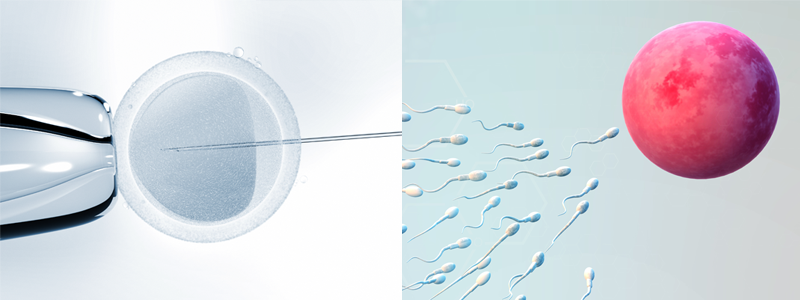1. Infertility is not uncommon
Infertility is a very common phenomenon, affecting around 1 in 6 couples. The causes of infertility are generally related to the woman 40% of the time and the man 40% of the time, with 20% resulting from a combination of both. Around 5% of infertile couples turn to IVF to help them conceive. There are also fertile people who pursue IVF for other reasons, e.g. same-sex couples, single women, those carrying a genetic disease and those creating a saviour sibling. This means that 1 in 50 babies are now born using IVF.
2. Conventional IVF can be very time consuming
In-vitro fertilisation, or IVF, occurs when eggs are removed from a woman’s ovaries, fertilised outside the body and then replaced inside the womb. The treatment process can be lengthy, as the woman’s body is typically stimulated in order that eggs can be collected. This can involve taking medication and going to the clinic for scans/check-ups for many weeks before the egg collection takes place. After the procedure, which usually takes only an hour, patients must come back to the clinic for the embryo to be transferred before returning for a pregnancy test. This means that in total treatment can take around 4-5 weeks. There are shorter forms of treatment however, which are detailed below.
3. There are different types of IVF available
Although conventional IVF is the most common type of IVF in the UK, this is not the only treatment available or necessarily the most appropriate treatment. There are also other, less drug-intense forms of treatment. Natural IVF is the least intensive of these and does not use any stimulating drugs. Natural Modified IVF only requires 3-4 days worth of drugs, and Mild IVF (or mini IVF) 5-9 days of drugs. The other advantage of these treatments is that they are carried out within the cycle, without halting the menstrual cycle and restarting it again. Egg and sperm donation and surrogacy cycles are also available if necessary.
4. The price may be more than the cycle cost
Patients sometimes mistake the cycle cost for the entire cost of treatment. The cycle cost includes scans, egg collection, embryology and embryo transfer. However, because treatment is generally tailored to your individual circumstances, the costs for blood tests, medication and additional techniques are not included in this price and will vary from patient to patient. It is also necessary to pay the HFEA fee and most patients opt for sedation. Make sure you ask a clinic for a full breakdown of costs and think about any added extras you may want before starting treatment.
5. Age matters
When it comes to fertility treatment, the younger age it is performed the better in terms of success rates. In women, the decline in fertility begins at around 35 and accelerates though the 30s and 40s. This means that by the early 40s it is much more difficult to conceive and by 45 there is a much reduced chance of treatment succeeding. This is due to the decline in both the number and quality of eggs in the ovaries over time. Although men’s fertility remains more stable, it also declines over time, with declining testosterone levels meaning that fewer sperm are produced. Similarly to women, men’s sperm acquires mutations over time meaning that sperm gradually declines in both quality and quantity. All is not lost for older patients, but if you are considering starting fertility treatment, it is better to do so sooner rather than later.
6. Success rates can be misleading
Success rates are not tailored to your exact circumstances and so can give a misleading picture about the chances of your success. Some clinics turn away poor prognosis patients such as older women, those with a low egg reserve or with a specific gynaecological problem, which means that high headline success rates may not in fact be relevant for your particular circumstances. It is also important to look carefully at exactly what is being measured. Some clinics measure success by positive pregnancy tests, others by clinical pregnancy and others by live births. It is therefore not considered useful to compare different clinics’ success rates; this is backed by the HFEA who advise patients not to compare success rates.
7. You may need more than one cycle of treatment
The success rates of IVF are around 35% on average, meaning that most patients will have to undergo a number of treatments before achieving a successful pregnancy. As new techniques are developed and fine-tuned, success rates are constantly improving, but usually only by small amounts. If you are starting fertility treatment, it is very important to think that you are starting a course of treatment, not just individual treatment cycles. This allows you to mentally prepare for the chance that you may need multiple treatments. You should ask your doctor to give you an individual estimation of success both in a single cycle and over a course of treatment. It should be noted that a recent study showed that the chance of success increases with an increased number of IVF cycles, with 65% having conceived after 6 cycles of treatment.
8. Frozen is just as good as fresh
Recent studies have suggested that frozen eggs and embryos are just as viable as fresh ones. If possible, it is better to freeze embryos than eggs as they are more stable and more likely to survive thawing. It has been suggested that a woman freezing 12 eggs under the age of 35 has a 50% chance of having a baby with these eggs through fertility treatment.
9. You are more likely to have a multiple pregnancy with IVF
It is widely known that fertility treatment can result in a greater likelihood of a multiple pregnancy. Quadruplets and higher-orders of multiples, although receiving lots of publicity, are rarely the result of IVF. Instead, they usually arise as a result of high dose fertility drugs combined with intra-uterine insemination (IUI). Twins and triplets however, are more common with IVF, with the chance of a multiple birth increasing from 3% in natural conception to 33% with IVF treatment. This is because more than one embryo can be placed in the womb to increase the chances of pregnancy. In the UK, many clinics operate with a strong ‘single embryo transfer’ policy in order to reduce the incidence of multiple births. There are many risks associated with the delivery of twins and so it is important to not unnecessarily return more than one embryo. Multiple-embryo transfers are therefore mostly recommended for difficult prognosis patients. Identical as well as non-identical twins are more likely to occur, possibly because of techniques associated with IVF such as ICSI when a sperm is injected into the sperm, and PGD when a cell is removed for inspection.
10. There are lots of additional techniques available
Many individuals/couples undergoing IVF wish to increase their chances of success by any means possible. There are a number of additional techniques which may improve success such as Embryoscope, PGD and PGS. Embryoscope is a special type of incubator with a live camera feed. This means that the embryos can be monitored at every stage of development without having to be removed from their ideal environment. Pre-implantation genetic screening, or PGS, is an advanced test used to check an embryo for chromosomal abnormalities. One cell of the embryo is removed and examined to see if it has the correct number of chromosomes, before healthy embryos are replaced in the uterus. These techniques may not necessarily have a proven benefit in your circumstances so it is important to discuss with your Doctor whether they have relevance for you or not.
If you would like to find out more about IVF treatment with us please







